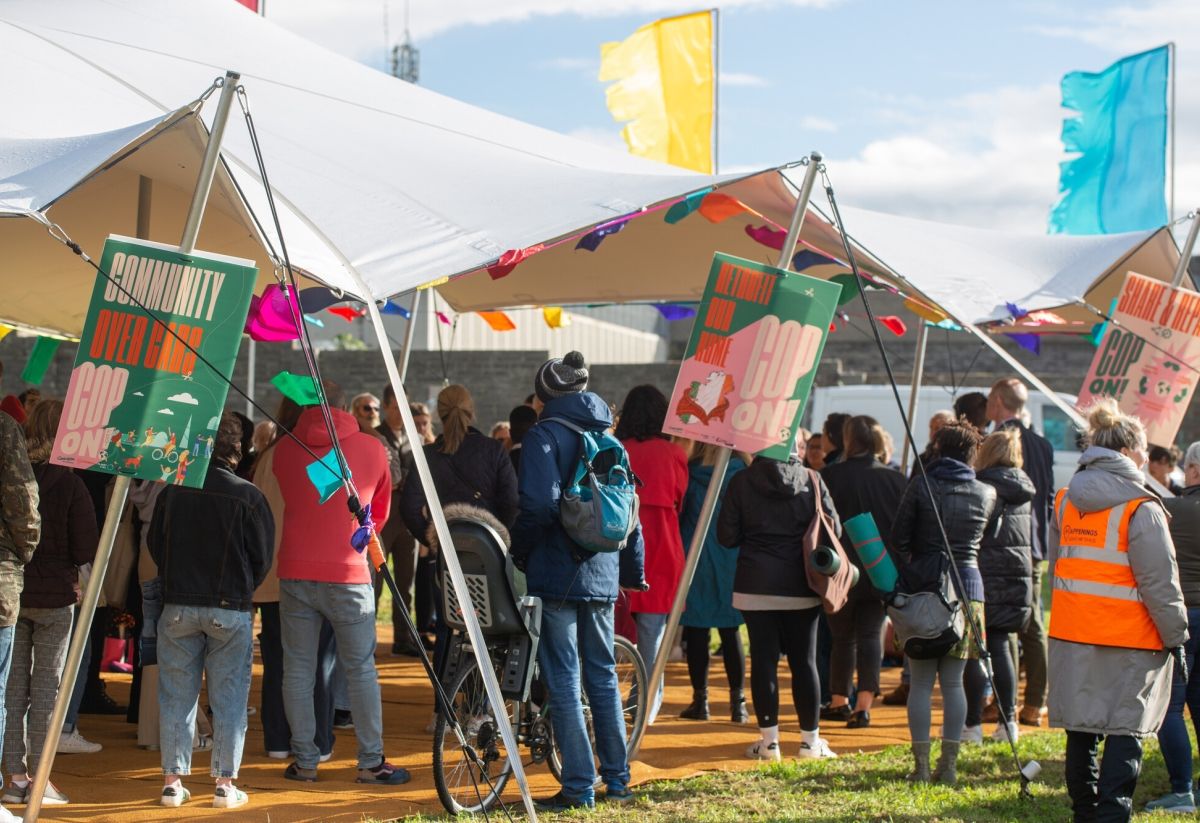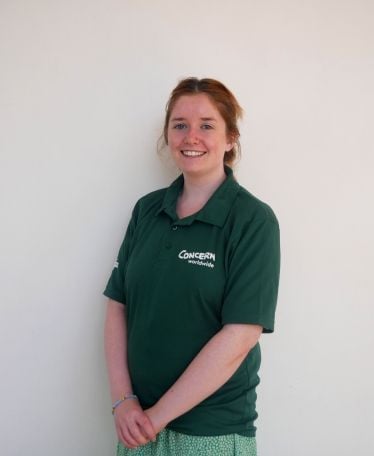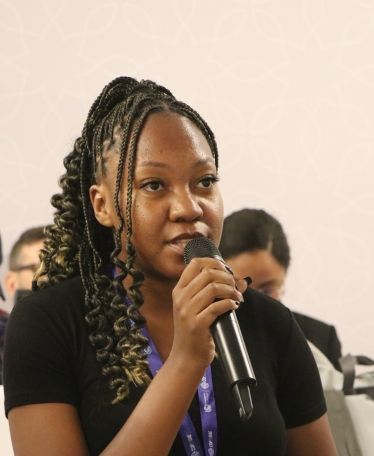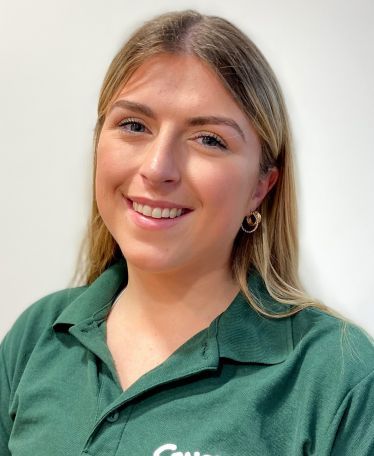
Advocate for a better future
Ambassadors
Meet Dearbhla Richardson

People often disengage with climate action because it is hard to find time to act given the socioeconomic pressures they are under. My main aim is to encourage these people not to lose hope, and that no matter what they are doing, they can contribute to a better world for everyone.
Concern Worldwide’s Youth Climate Ambassador Dearbhla Richardson began her role by visiting communities in Kenya which are working to adapt to some of the harshest impacts of climate change.
Dearbhla is from Cobh, Co. Cork, and is in the final year of her degree in International Development at UCC, where she is also Environmental and Sustainability Representative on the Students’ Union. In addition, Dearbhla is also a climate justice advocate with Fridays For Future.
Her role as Youth Climate Ambassador is to engage young Irish people on climate change and climate justice issues, and Concern’s climate work. She plans to do this through talks, workshops and other events over the coming year.
“I hope to encourage young people to get involved where they can. People often disengage with climate action because it is hard to find time to act given the socioeconomic pressures they are under,” she said. “My main aim is to encourage these people not to lose hope, and that no matter what they are doing, they can contribute to a better world for everyone.”
Dearbhla said policy and systematic change was needed. “Everyone should do the best they can with the capacity they have. But policy and systemic change is needed to make it easier for people to a sustainable life,” she said.
In her first task as Youth Climate Ambassador, Dearbhla visited families in Turkana who are radically restructuring the way they live in the wake of the worst drought in 40 years. The drought ravaged the region, destroying crops and livestock, and contributing to soaring levels of hunger and malnutrition.
“During my time in Turkana, we met with communities facing the direct consequences of climate change,” she said. “We met families who had to change their entire way of living due to the prolonged droughts, where some areas had gone without rain for two years, to the point where there was no moisture in the soil.
“We spoke to men who had been traditional pastoralists, who had lost all of their livestock. They were incredibly truthful about feeling a loss of purpose. Pastoralism has been a traditional way of living in this region for thousands of years.
“We also met with some women who are having very successful harvests, using climate smart agriculture techniques. Because of this new source of income, they can now manage to afford to send their children to school, and also have enough food for the family to eat.”
Dearbhla’s biggest takeaway from the trip was the willingness of the Turkana people to adapt and their resourcefulness. “They knew exactly what was required to adapt, but need funding to do it,” she said. “They all had specific requests, none of which were extreme or unreasonable – such as access to clean drinking water, soap or fencing to keep their school or crops safe. They just needed the funding.”
Dorothy Kazombo Mwale

The consequences of not taking action have become incredibly alarming.
Dorothy is an environmentalist and climate change activist from Malawi. She attended COP28 with Concern Worldwide. Here, she gives a glimpse into COP28 from a youth perspective.
The curtains have closed on the long awaited Conference of Parties (COP28). COP28 has represented a powerful display of hope. The event brought together world leaders to tackle climate change. The decisions made at COP28 were critical in shaping the future of our planet. It became incredibly clear that the fulfilment of these commitments and the inclusion of young people’s voices played an important role in making sure that mere promises are transformed into concrete actions.
This global gathering of leaders, experts and activists proved to be a pivotal moment in our collective efforts to tackle the pressing issue of climate change, and in particular loss and damage. Loss and Damage has been a particular area of interest this year, especially in Malawi, due to the effects of cyclones in the country - the most recent being Cyclone Freddy. During the first day of COP28, countries made commitments towards the Loss and Damage fund that was first tabled at COP27 in 2022, leading to the operationalisation of the fund and associated funding arrangements. Several significant pledges were announced by numerous countries, namely the UAE, Germany, the UK, the USA, and Japan. Despite these commitments being made, it has always been a true test for countries to fulfil their promises.
The atmosphere was filled with a type of energy that was giving a sense of urgency and determination, as delegates from all over the world gathered in one place, Expo City in Dubai, to discuss and negotiate text and solutions. Gone are the days we say time is running out, because time itself had already run out. It would take over 30 years in order to reverse the effects of climate change, even if we had completely transitioned to Net Zero. The consequences of not taking action have become incredibly alarming.
We hear this time and time again, that the impacts of climate change are already being felt, with vulnerable communities and children bearing the brunt of extreme weather events and rising sea levels. However, even with these challenges, there is still a glimmer of hope. While the scientific community continues to present compelling evidence, emphasising the need for immediate action, they also provide the solutions that can reverse the impacts of climate change. The voices of activists and grassroots organisations were amplified every single day during COP.
In the space of climate change negotiations, COP28 managed to bring attention to an equally important aspect - the inclusion of young voices. Imagine a world where young people have a voice that is not only heard but actively sought after. This space was created for individuals from all around the world to come together and participate in decision-making processes. Through this space, young individuals from different backgrounds and cultures came together to share their thoughts, ideas, and concerns during side events, bi-lateral meetings and delegation meetings. In a remarkable display of commitment, the government of Malawi has made significant strides to ensure equal representation, especially for young women, in order to foster a more diverse and inclusive dialogue.
In a significant development, COP28 has managed to solidify global agreements that aim to steer us away from our dependence on fossil fuels. By acknowledging the urgent need to transition to cleaner and more sustainable energy sources, countries from all around the globe have taken a crucial step towards safeguarding our environment by agreeing to “transition away” from fossil fuels. A significant milestone has been reached with the pledge to triple renewable energy capacities by 2030. This commitment demonstrates a step to combat climate change and transition to a greener world, and a strong commitment to reducing our reliance on fossil fuels and embracing alternative sources of energy that have a minimal impact on our environment.
I was privileged to be part of the Malawi Delegation Team as a Junior Climate Change Negotiator, allowing me to have access to negotiation rooms and contribute to discussions meaningfully. I was also given the opportunity to speak at a side event organised by WWF Africa about the barriers that prevent young women and girls from participating in Nature Based Solutions for Climate Change Adaptation initiatives in Africa, and how we can overcome it. One of the points I raised was the fact that it is crucial to identify and support young women and adolescent girls who are making a difference in the fight for climate justice, and to support them so that they have the capacity to act as strong role models.
However, despite the decisions and annual commitments made, our push for countries to act on climate change must still persist. We refuse to give up. The cycle of promises is just the beginning. There is need to demand tangible steps towards a sustainable future, rallying youth voices for collective and genuine change towards climate change. We must also acknowledge commitments but urge countries to transition from words to action. Our planet's future relies on it.
Jenny Salmon

I may not be a climate expert, but I do know this: some of the poorest people in the world are suffering the effects of climate change, despite the fact that they have contributed to it the least.
Concern's first Youth Climate Ambassador Jenny Salmon brought climate action messages collected from Irish people to COP27.
The Trinity College Dublin law student from Bray, Co. Wicklow travelled to the climate conference in Egypt in November 2022 after being appointed as youth climate ambassador while studying law at Trinity College Dublin. Here, she got to engage with other young climate activists and climate justice leaders and hear first hand experience from people tackling climate change head on, as well as speaking to politicians and lawmakers.
In addition, Jenny saw how Concern Worldwide is building climate resilience and addressing the impacts of climate change through our programmes, and represented the organisation at our inaugural COPON! Festival in Dublin, where she collected messages from Irish young people to bring to COP27.
Become a Youth Climate Ambassador
Help Concern advocate for climate change on the world stage
Sinéad from our 1Planet4All team will reach out to you about next steps
We’ll never give your details away, your data is safe with us